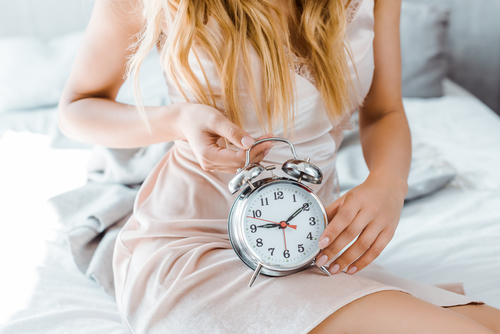
The quality and length of sleep you receive every night can have a profound impact on your skin’s overall health and appearance. When we sleep, our bodies can recharge. During sleep, our body and skin can heal, restore and eliminate toxins from the skin.
If you’re missing out on quality sleep, the chances are your skin is suffering in the process.
Sleep and Your Skin
- During the first three hours of sleep. Your body will start producing the human growth hormone from the pituitary gland. As we age, this hormone is necessary for the maintenance of youthful and radiant skin. Without this vital hormone release, your skin is unable to be repaired from daily damage and thus induces the aging process.
- During the middle two hours of sleep. This equally important time frame is when melatonin is increased within the body. Melatonin is a hormone that is responsible for regulating your circadian rhythm or the patterns in which you are awake and when you are asleep. This hormone release also acts as an antioxidant that helps to protect the skin from damaging free radicals.
- During the final two hours of sleep. During the active REM sleep stage, levels of cortisol (aka the stress hormone) decrease. The skin’s temperature also drops to its lowest point allowing muscles to relax and become immobile. This stage of sleep gives the skin its deepest recovery of the night.
How Lack of Sleep is Ruining Your Skin
- Dull skin. When you miss sleep your cortisol levels increase. Cortisol triggers inflammation. Breaking down the proteins in the skin, inflammation prevents your skin from being radiant and smooth.
- Dry skin. Are you aware that during the time you sleep, your body perspires? It’s true. While you are asleep your body’s hydration rebalances and recovers extra moisture. This makes sleep a natural moisturizer that can help to smooth out wrinkles and fine lines on the surface of the skin.
- A lack of sleep can also affect the moisture levels in your skin and lower your complexion PH level. A skin imbalance is created when your PH levels drop. This imbalance causes your skin not to produce the moisture it so desperately needs, leading to dry and irritated skin.
- Collagen production. Chronic stress harms the integrity of the collagen in your skin. Collagen is a vital ingredient in the elasticity and structure of the skin. When collagen is broken down, the surface of your skin shows more noticeable signs of aging by becoming thinner and less firm. Wrinkles can be seen more prominently when the skin’s appearance is less smooth.
- Dark circles. Lack of sleep makes your blood vessel dilate, leading to what is widely known as dark circles. Not getting enough sleep in addition to poor water balance creates those dark circles and puffy eyes that so many of us suffer from. Sleeping on your stomach also causes inflammation and puffiness. Liquid from your stomach can drain and catch in the trough of your under eye.
Improving Your Sleep and Your Skin
Follow these helpful tips to get the most out of your sleep:
- Establish a bedtime routine and stick to it
- Create a sleep hygiene routine to promote a good night’s rest
- Wash your face every night and apply skin care treatments
- Aim to get 7-9 hours of quality sleep per night
- Limit alcohol and cigarette consumption before bed
- Upgrade your bed linen to a high thread count to help avoid any pulling on the skin
- If you are prescribed a CPAP machine, use it. Researchers recently found apnea sufferers who use their CPAP machines have a more youthful appearance with fewer signs of aging
Skin Still Suffering?
Let your skin hit the reset button with a treatment from Radiance Skincare & Laser Medspa. Our variety of non-invasive anti-aging treatments will deliver the rejuvenating, restful-looking results you’re seeking without downtime and without stress. The next best thing to a good night’s sleep is a soothing medspa treatment! Schedule a consultation today to improve the quality of your skin.
